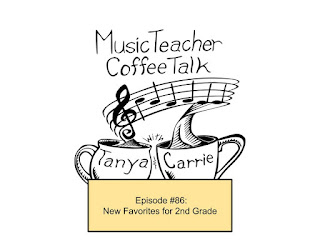Episode #58: Acing your Music Teacher Evaluation
 In this episode, Tanya and Carrie discuss strategies and tips for acing your music teacher evaluation. Your evaluation should be a natural demonstration of the amazing work you do every day with your students. But let's be honest: it's perfectly normal to want to up your game a little bit on those evaluation days to help you grow as an educator, and to advocate for your program and your students. Here are our 5 tips for acing that evaluation!
In this episode, Tanya and Carrie discuss strategies and tips for acing your music teacher evaluation. Your evaluation should be a natural demonstration of the amazing work you do every day with your students. But let's be honest: it's perfectly normal to want to up your game a little bit on those evaluation days to help you grow as an educator, and to advocate for your program and your students. Here are our 5 tips for acing that evaluation!
5 Tips for Acing your Music Teacher Evaluation
1. Know your expectations and the rubric that your evaluator will be using.
Use that rubric to help you set your routines, classroom management procedures, and overall curriculum.
Share links with your principal about Kodály-inspired teaching:
Holy Names University Kodály Center
Ask friends/colleagues come in and observe you teach before your evaluation or make a video of a lesson and evaluate your self using the rubric.
2. Create and share music teacher "look-fors" that you can show your evaluator before the evaluation so your administrator how things should look in the music room.
3. Plan a lesson that will demonstrate what your students can do and your strengths as an educator.
Use effective lesson design and quality long-range planning to create amazing daily lessons every day, not just for your evaluation. Check out Episode #56 and Episode #57 if you need more help with long-range planning.
Consider lessons that have:
- Music Literacy (practice activities)
- Active Music Making
- Movement
- Visible assessment tied to a clear learning target.
- Closure
4. Make note of all of the things you do outside of the classroom that demonstrate professional responsibilities, parent involvement, professional learning, etc.
Don't forget:
- Concerts and extracurricular clubs and events
- Parent communications (especially electronic things like Class Dojo messages, classroom website, newsletters, and e-mails)
- Attendance at Saturday workshops and larger conferences
- Time spent doing at-home PD including listening to podcasts like ours!
5. Take the feedback and look for growth opportunities.
Take time to reflect on your feedback. Look for professional development in your area (local Kodály and Orff chapter workshops) or seek out advanced training in Kodály, Orff, Dalcroze, MLT, etc. Attend local, state, or national conferences. Go observe master teachers (classroom or music teachers) in your school or your area. Look for books to read over the summer. Communicate to your evaluator what your next steps are to show that you are being proactive.


%20(4).jpg)


Would you be willing to share your district's music "look for" list? As I was listening this morning, I was thinking, I don't have anything tangible outside of the general TPEP rubric, and it would be helpful for me as a relatively new (2nd year) teacher to have something specific to music for my own reference.
ReplyDelete